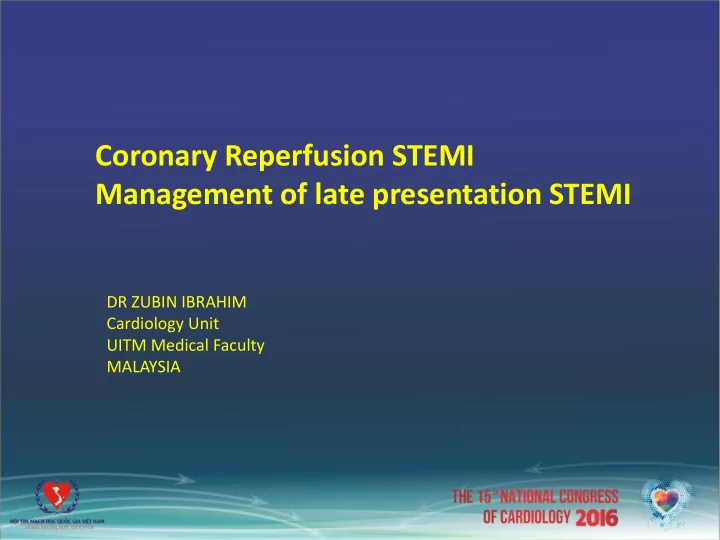

Coronary Reperfusion STEMI Management of late presentation STEMI DR ZUBIN IBRAHIM Cardiology Unit UITM Medical Faculty MALAYSIA
The debate is still on! • Definition • Guidelines -? • Randomised trials/Meta analysis • Open artery theory • Reperfusion injury • Complications – shock, bleeding
DEFINITION: Late presentation or “Late comers” • The current reperfusion paradigm in STEMI reperfusion attempted within 12 hours • Late presentation – 12 hours after symptom onset
Why do these patients present late? – Unaware/in denial/awareness/education – Atypical/no chest pain – Stuttering chest pain (UA to NSTEMI to STEMI) – Heart failure/ syncope/ Lethargy (Elderly) – refusal to seek medical attention/alternative medicine – Geography/socioeconomic status – Wrong diagnosis – Atypical presentation (pregnancy: coronary dissection) – Non-PCI hospital
Our patient 48 diabetic male, smoker, fisherman ‘Stuttering’ chest pain for > 16 hours ECG inferior leads- STEMI Complete AV block LV failure + shock (Killip IV) In the Emergency Department- Still has chest pain, ECG ST’s are still raised, echocardiogram LVEF 40%
Indications for PCI of an Infarct Artery in Patients Who Were Managed With Fibrinolytic Therapy or Who Did Not Receive Reperfusion Therapy *Although individual circumstances will vary, clinical stability is defined by the absence of low output, hypotension, persistent tachycardia, apparent shock, high-grade ventricular or symptomatic supraventricular tachyarrhythmias, and spontaneous recurrent ischemia.
Why is PCI in ‘latecomers’ different? -Thrombus - Microvascular injury (reperfusion injury) - Slow flow-no-reflow -Arrhythmia -Shock-LV dysfunction** -Elderly/Multiple co-morbidities**
Thrombus • direct stenting • deferred stenting (after TIMI III) • thrombus aspiration in selected patients? • anticoagulation • anti platelets (?Ticagrelor) • catheters (7Fr for all?) • GP IIIbIIa inhibitors in selected patients •temporary pacing in RCA’s
Slow-flow/no-reflow • related to thrombus/microemboli • previous slide • intracoronary Adenosine/Verapamil/nitroprusside • avoidance, treatment of shock (vicious cycle)
• Inferior STEMI • Complete AV block • Previous admission for unstable angina • Shock- IV fluids and single ionotropic support
• Slow-flow post stent deployment/post dilatation with NC balloon • Catheter thrombus • Operator (co-operator) must focus on everything else
Patient 2 • 54, male- Inferior STEMI (presented 10 hours after initial symptoms) • DM/HT/hyperlipidemia • previous admissions- ACS + LVFailure- medical therapy only
Case 3
Aspirated thrombus ++ and POBA
After thrombus aspiration
1 st Angiojet Run with 5Fr catheter
Final result, after 4 Angiojet runs
Next Day
Post PCI 3.5-4.5x17mm (self-expanding coronary stent)
summary • recognise difficulties, potential complications • multidisciplinary approach • some evidence to guide us — > no clear answers • multiple tools/equipment may be used • thrombosis,no-reflow, shock • defer invasive therapy in selected patients
Recommend
More recommend